Ethical Considerations: Medically Futile Care in Nursing Practice
VerifiedAdded on 2022/09/06
|14
|4036
|17
Essay
AI Summary
This essay, written for a nursing course at John Abbott College, delves into the ethical complexities of providing care to patients deemed medically futile. The author, drawing from a personal clinical experience, examines the moral distress experienced by nurses when providing care that is not in the patient's best interest, particularly when family members make decisions against medical advice. The paper explores the ethical burden on nurses, the perspectives of surrogate decision-makers, and the impact of cultural and religious beliefs on end-of-life care. It utilizes credible nursing references to analyze issues such as conflicting values, miscommunication, and the challenges of balancing patient advocacy with family wishes. The essay also examines the consequences of futile care for nurses, including moral distress and burnout, while also exploring the opposing perspectives of families and the influence of cultural differences in decision-making. The author proposes strategies for resolving these ethical dilemmas and emphasizes the importance of understanding the diverse viewpoints of healthcare providers and families.
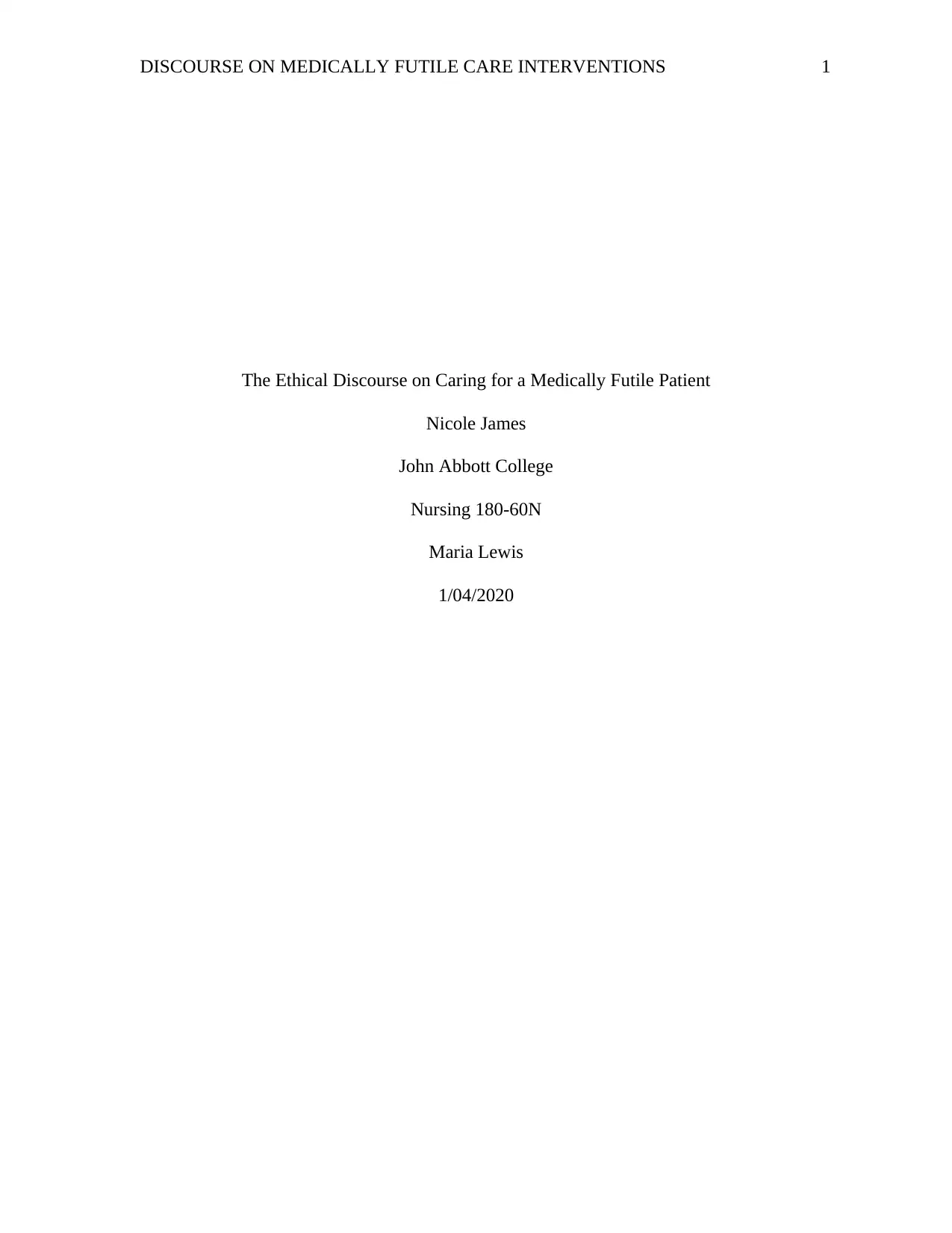
DISCOURSE ON MEDICALLY FUTILE CARE INTERVENTIONS 1
The Ethical Discourse on Caring for a Medically Futile Patient
Nicole James
John Abbott College
Nursing 180-60N
Maria Lewis
1/04/2020
The Ethical Discourse on Caring for a Medically Futile Patient
Nicole James
John Abbott College
Nursing 180-60N
Maria Lewis
1/04/2020
Paraphrase This Document
Need a fresh take? Get an instant paraphrase of this document with our AI Paraphraser
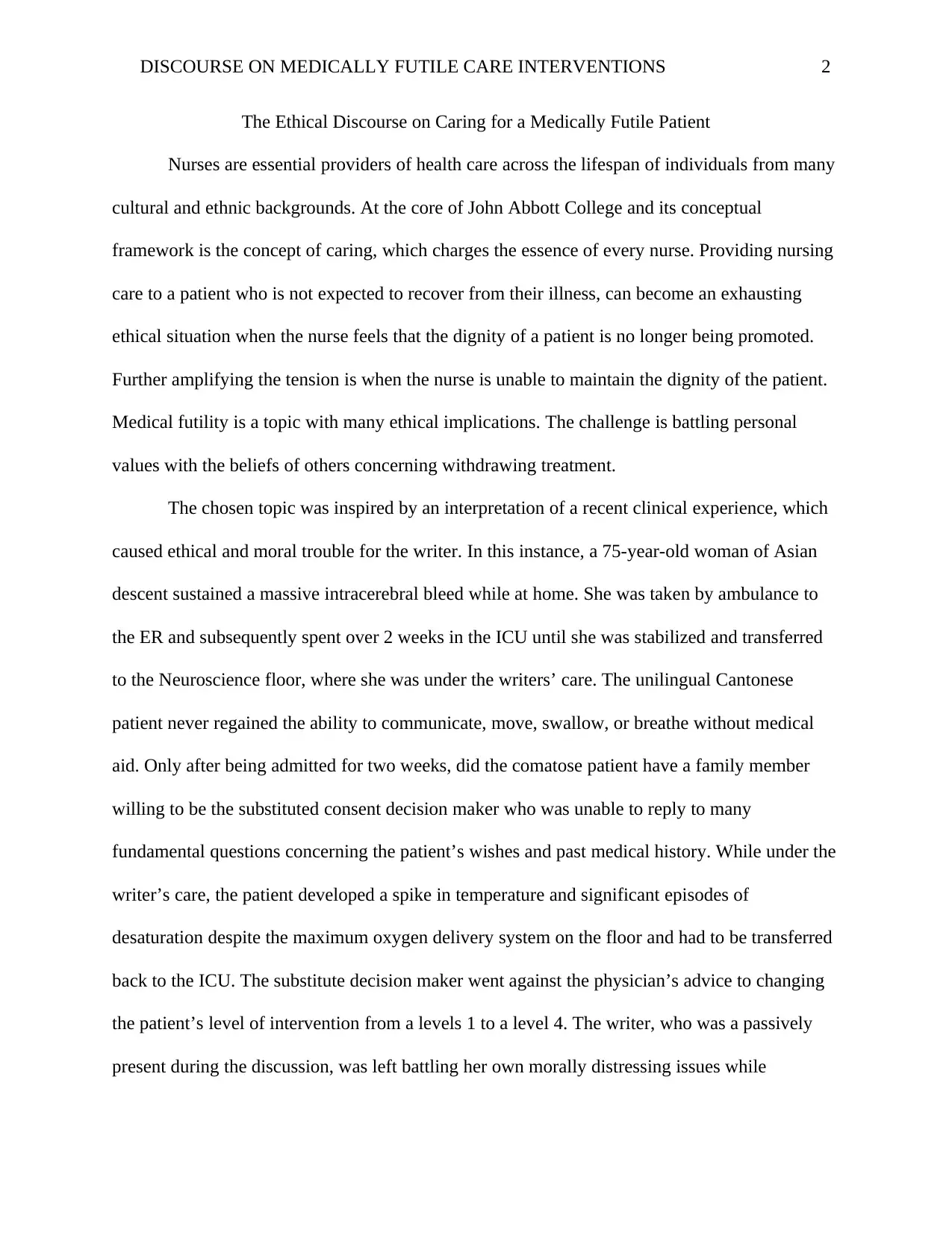
DISCOURSE ON MEDICALLY FUTILE CARE INTERVENTIONS 2
The Ethical Discourse on Caring for a Medically Futile Patient
Nurses are essential providers of health care across the lifespan of individuals from many
cultural and ethnic backgrounds. At the core of John Abbott College and its conceptual
framework is the concept of caring, which charges the essence of every nurse. Providing nursing
care to a patient who is not expected to recover from their illness, can become an exhausting
ethical situation when the nurse feels that the dignity of a patient is no longer being promoted.
Further amplifying the tension is when the nurse is unable to maintain the dignity of the patient.
Medical futility is a topic with many ethical implications. The challenge is battling personal
values with the beliefs of others concerning withdrawing treatment.
The chosen topic was inspired by an interpretation of a recent clinical experience, which
caused ethical and moral trouble for the writer. In this instance, a 75-year-old woman of Asian
descent sustained a massive intracerebral bleed while at home. She was taken by ambulance to
the ER and subsequently spent over 2 weeks in the ICU until she was stabilized and transferred
to the Neuroscience floor, where she was under the writers’ care. The unilingual Cantonese
patient never regained the ability to communicate, move, swallow, or breathe without medical
aid. Only after being admitted for two weeks, did the comatose patient have a family member
willing to be the substituted consent decision maker who was unable to reply to many
fundamental questions concerning the patient’s wishes and past medical history. While under the
writer’s care, the patient developed a spike in temperature and significant episodes of
desaturation despite the maximum oxygen delivery system on the floor and had to be transferred
back to the ICU. The substitute decision maker went against the physician’s advice to changing
the patient’s level of intervention from a levels 1 to a level 4. The writer, who was a passively
present during the discussion, was left battling her own morally distressing issues while
The Ethical Discourse on Caring for a Medically Futile Patient
Nurses are essential providers of health care across the lifespan of individuals from many
cultural and ethnic backgrounds. At the core of John Abbott College and its conceptual
framework is the concept of caring, which charges the essence of every nurse. Providing nursing
care to a patient who is not expected to recover from their illness, can become an exhausting
ethical situation when the nurse feels that the dignity of a patient is no longer being promoted.
Further amplifying the tension is when the nurse is unable to maintain the dignity of the patient.
Medical futility is a topic with many ethical implications. The challenge is battling personal
values with the beliefs of others concerning withdrawing treatment.
The chosen topic was inspired by an interpretation of a recent clinical experience, which
caused ethical and moral trouble for the writer. In this instance, a 75-year-old woman of Asian
descent sustained a massive intracerebral bleed while at home. She was taken by ambulance to
the ER and subsequently spent over 2 weeks in the ICU until she was stabilized and transferred
to the Neuroscience floor, where she was under the writers’ care. The unilingual Cantonese
patient never regained the ability to communicate, move, swallow, or breathe without medical
aid. Only after being admitted for two weeks, did the comatose patient have a family member
willing to be the substituted consent decision maker who was unable to reply to many
fundamental questions concerning the patient’s wishes and past medical history. While under the
writer’s care, the patient developed a spike in temperature and significant episodes of
desaturation despite the maximum oxygen delivery system on the floor and had to be transferred
back to the ICU. The substitute decision maker went against the physician’s advice to changing
the patient’s level of intervention from a levels 1 to a level 4. The writer, who was a passively
present during the discussion, was left battling her own morally distressing issues while
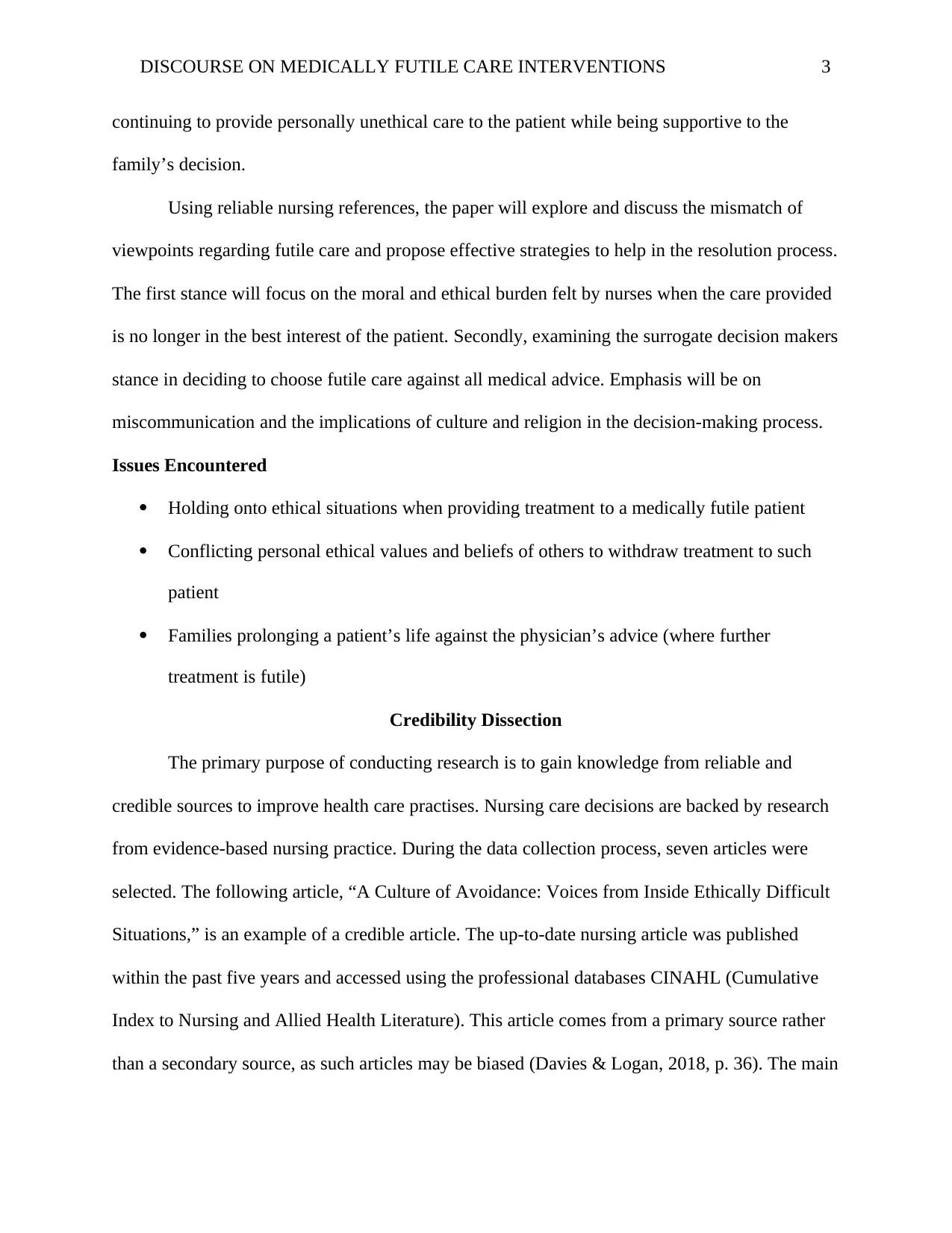
DISCOURSE ON MEDICALLY FUTILE CARE INTERVENTIONS 3
continuing to provide personally unethical care to the patient while being supportive to the
family’s decision.
Using reliable nursing references, the paper will explore and discuss the mismatch of
viewpoints regarding futile care and propose effective strategies to help in the resolution process.
The first stance will focus on the moral and ethical burden felt by nurses when the care provided
is no longer in the best interest of the patient. Secondly, examining the surrogate decision makers
stance in deciding to choose futile care against all medical advice. Emphasis will be on
miscommunication and the implications of culture and religion in the decision-making process.
Issues Encountered
Holding onto ethical situations when providing treatment to a medically futile patient
Conflicting personal ethical values and beliefs of others to withdraw treatment to such
patient
Families prolonging a patient’s life against the physician’s advice (where further
treatment is futile)
Credibility Dissection
The primary purpose of conducting research is to gain knowledge from reliable and
credible sources to improve health care practises. Nursing care decisions are backed by research
from evidence-based nursing practice. During the data collection process, seven articles were
selected. The following article, “A Culture of Avoidance: Voices from Inside Ethically Difficult
Situations,” is an example of a credible article. The up-to-date nursing article was published
within the past five years and accessed using the professional databases CINAHL (Cumulative
Index to Nursing and Allied Health Literature). This article comes from a primary source rather
than a secondary source, as such articles may be biased (Davies & Logan, 2018, p. 36). The main
continuing to provide personally unethical care to the patient while being supportive to the
family’s decision.
Using reliable nursing references, the paper will explore and discuss the mismatch of
viewpoints regarding futile care and propose effective strategies to help in the resolution process.
The first stance will focus on the moral and ethical burden felt by nurses when the care provided
is no longer in the best interest of the patient. Secondly, examining the surrogate decision makers
stance in deciding to choose futile care against all medical advice. Emphasis will be on
miscommunication and the implications of culture and religion in the decision-making process.
Issues Encountered
Holding onto ethical situations when providing treatment to a medically futile patient
Conflicting personal ethical values and beliefs of others to withdraw treatment to such
patient
Families prolonging a patient’s life against the physician’s advice (where further
treatment is futile)
Credibility Dissection
The primary purpose of conducting research is to gain knowledge from reliable and
credible sources to improve health care practises. Nursing care decisions are backed by research
from evidence-based nursing practice. During the data collection process, seven articles were
selected. The following article, “A Culture of Avoidance: Voices from Inside Ethically Difficult
Situations,” is an example of a credible article. The up-to-date nursing article was published
within the past five years and accessed using the professional databases CINAHL (Cumulative
Index to Nursing and Allied Health Literature). This article comes from a primary source rather
than a secondary source, as such articles may be biased (Davies & Logan, 2018, p. 36). The main
⊘ This is a preview!⊘
Do you want full access?
Subscribe today to unlock all pages.

Trusted by 1+ million students worldwide
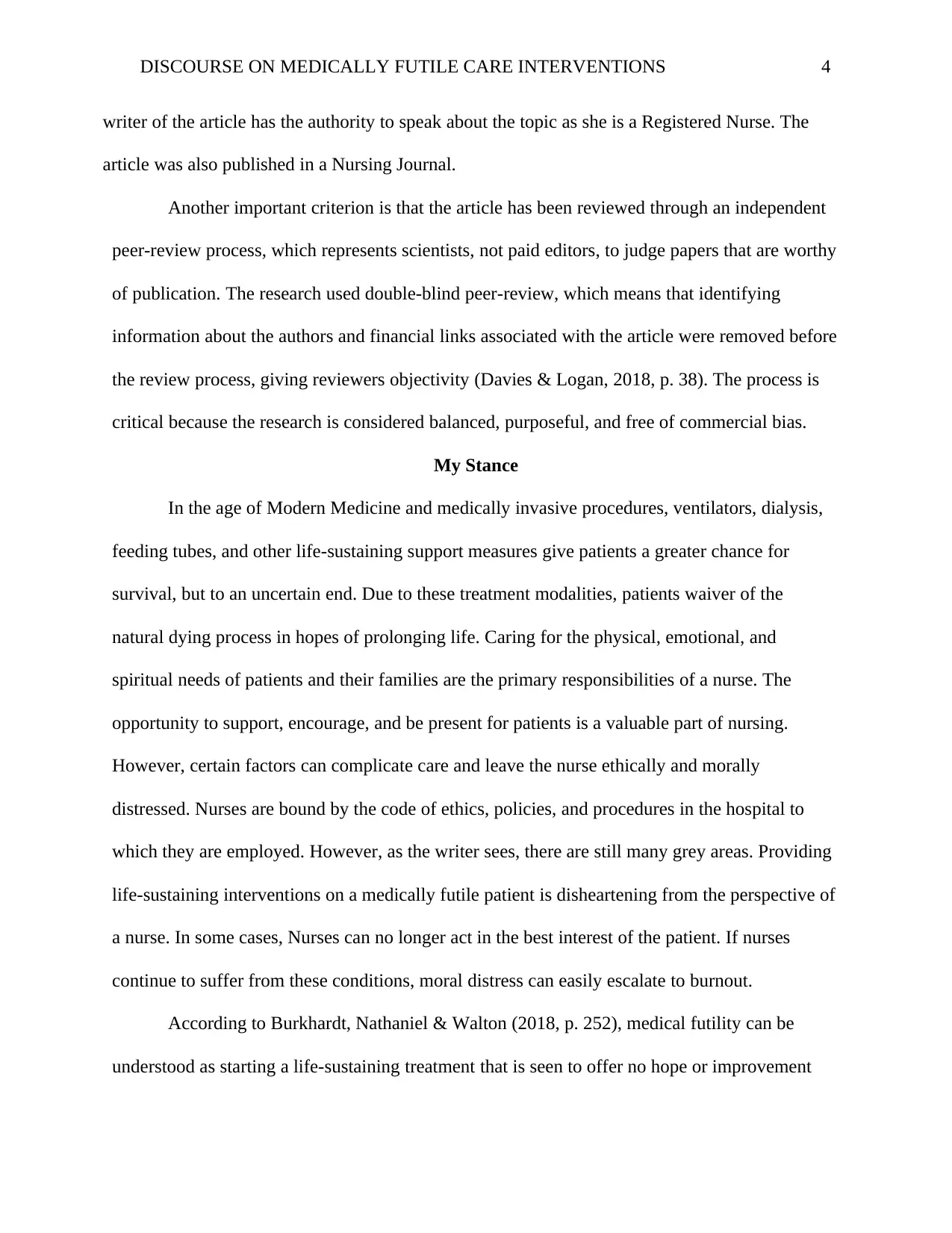
DISCOURSE ON MEDICALLY FUTILE CARE INTERVENTIONS 4
writer of the article has the authority to speak about the topic as she is a Registered Nurse. The
article was also published in a Nursing Journal.
Another important criterion is that the article has been reviewed through an independent
peer-review process, which represents scientists, not paid editors, to judge papers that are worthy
of publication. The research used double-blind peer-review, which means that identifying
information about the authors and financial links associated with the article were removed before
the review process, giving reviewers objectivity (Davies & Logan, 2018, p. 38). The process is
critical because the research is considered balanced, purposeful, and free of commercial bias.
My Stance
In the age of Modern Medicine and medically invasive procedures, ventilators, dialysis,
feeding tubes, and other life-sustaining support measures give patients a greater chance for
survival, but to an uncertain end. Due to these treatment modalities, patients waiver of the
natural dying process in hopes of prolonging life. Caring for the physical, emotional, and
spiritual needs of patients and their families are the primary responsibilities of a nurse. The
opportunity to support, encourage, and be present for patients is a valuable part of nursing.
However, certain factors can complicate care and leave the nurse ethically and morally
distressed. Nurses are bound by the code of ethics, policies, and procedures in the hospital to
which they are employed. However, as the writer sees, there are still many grey areas. Providing
life-sustaining interventions on a medically futile patient is disheartening from the perspective of
a nurse. In some cases, Nurses can no longer act in the best interest of the patient. If nurses
continue to suffer from these conditions, moral distress can easily escalate to burnout.
According to Burkhardt, Nathaniel & Walton (2018, p. 252), medical futility can be
understood as starting a life-sustaining treatment that is seen to offer no hope or improvement
writer of the article has the authority to speak about the topic as she is a Registered Nurse. The
article was also published in a Nursing Journal.
Another important criterion is that the article has been reviewed through an independent
peer-review process, which represents scientists, not paid editors, to judge papers that are worthy
of publication. The research used double-blind peer-review, which means that identifying
information about the authors and financial links associated with the article were removed before
the review process, giving reviewers objectivity (Davies & Logan, 2018, p. 38). The process is
critical because the research is considered balanced, purposeful, and free of commercial bias.
My Stance
In the age of Modern Medicine and medically invasive procedures, ventilators, dialysis,
feeding tubes, and other life-sustaining support measures give patients a greater chance for
survival, but to an uncertain end. Due to these treatment modalities, patients waiver of the
natural dying process in hopes of prolonging life. Caring for the physical, emotional, and
spiritual needs of patients and their families are the primary responsibilities of a nurse. The
opportunity to support, encourage, and be present for patients is a valuable part of nursing.
However, certain factors can complicate care and leave the nurse ethically and morally
distressed. Nurses are bound by the code of ethics, policies, and procedures in the hospital to
which they are employed. However, as the writer sees, there are still many grey areas. Providing
life-sustaining interventions on a medically futile patient is disheartening from the perspective of
a nurse. In some cases, Nurses can no longer act in the best interest of the patient. If nurses
continue to suffer from these conditions, moral distress can easily escalate to burnout.
According to Burkhardt, Nathaniel & Walton (2018, p. 252), medical futility can be
understood as starting a life-sustaining treatment that is seen to offer no hope or improvement
Paraphrase This Document
Need a fresh take? Get an instant paraphrase of this document with our AI Paraphraser
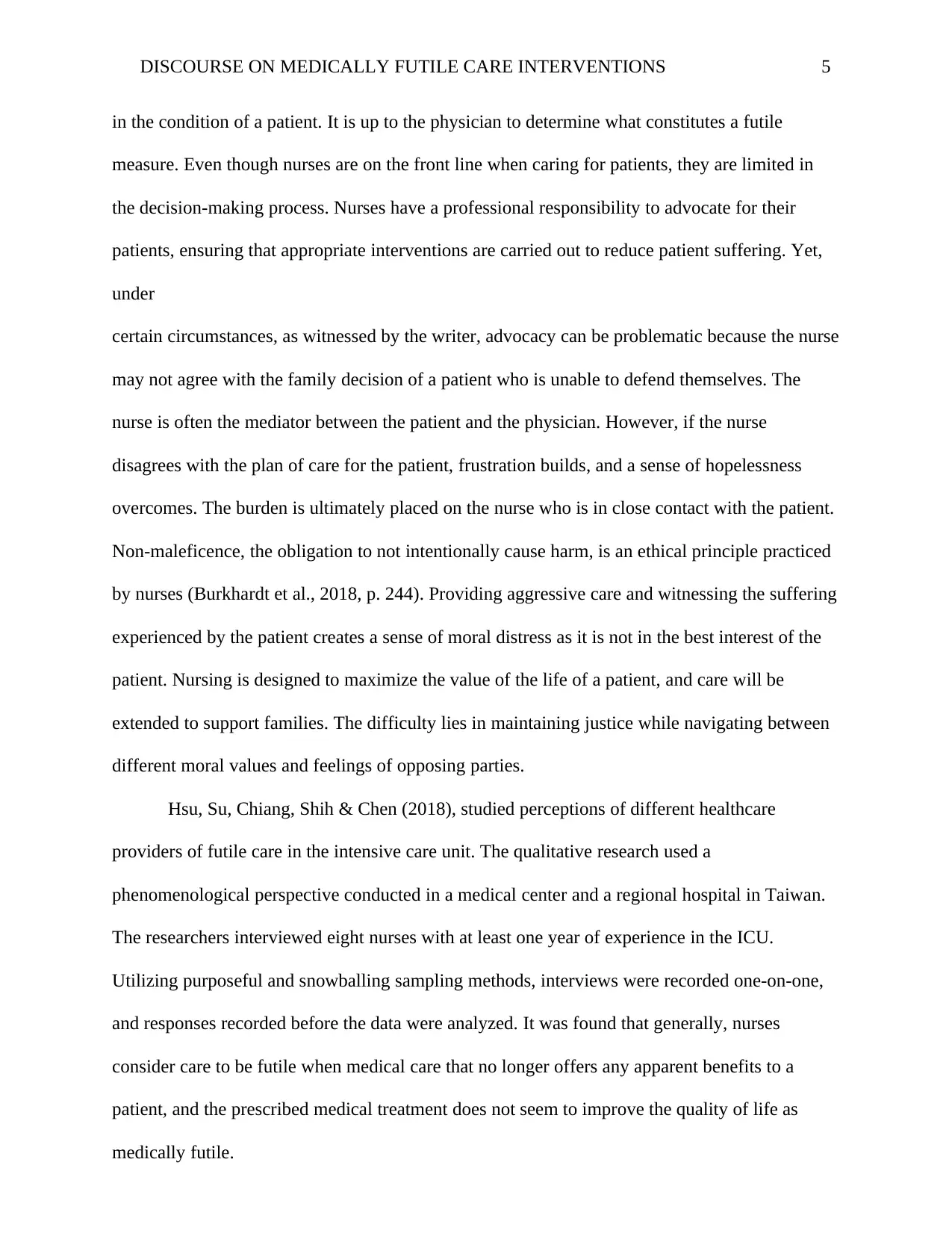
DISCOURSE ON MEDICALLY FUTILE CARE INTERVENTIONS 5
in the condition of a patient. It is up to the physician to determine what constitutes a futile
measure. Even though nurses are on the front line when caring for patients, they are limited in
the decision-making process. Nurses have a professional responsibility to advocate for their
patients, ensuring that appropriate interventions are carried out to reduce patient suffering. Yet,
under
certain circumstances, as witnessed by the writer, advocacy can be problematic because the nurse
may not agree with the family decision of a patient who is unable to defend themselves. The
nurse is often the mediator between the patient and the physician. However, if the nurse
disagrees with the plan of care for the patient, frustration builds, and a sense of hopelessness
overcomes. The burden is ultimately placed on the nurse who is in close contact with the patient.
Non-maleficence, the obligation to not intentionally cause harm, is an ethical principle practiced
by nurses (Burkhardt et al., 2018, p. 244). Providing aggressive care and witnessing the suffering
experienced by the patient creates a sense of moral distress as it is not in the best interest of the
patient. Nursing is designed to maximize the value of the life of a patient, and care will be
extended to support families. The difficulty lies in maintaining justice while navigating between
different moral values and feelings of opposing parties.
Hsu, Su, Chiang, Shih & Chen (2018), studied perceptions of different healthcare
providers of futile care in the intensive care unit. The qualitative research used a
phenomenological perspective conducted in a medical center and a regional hospital in Taiwan.
The researchers interviewed eight nurses with at least one year of experience in the ICU.
Utilizing purposeful and snowballing sampling methods, interviews were recorded one-on-one,
and responses recorded before the data were analyzed. It was found that generally, nurses
consider care to be futile when medical care that no longer offers any apparent benefits to a
patient, and the prescribed medical treatment does not seem to improve the quality of life as
medically futile.
in the condition of a patient. It is up to the physician to determine what constitutes a futile
measure. Even though nurses are on the front line when caring for patients, they are limited in
the decision-making process. Nurses have a professional responsibility to advocate for their
patients, ensuring that appropriate interventions are carried out to reduce patient suffering. Yet,
under
certain circumstances, as witnessed by the writer, advocacy can be problematic because the nurse
may not agree with the family decision of a patient who is unable to defend themselves. The
nurse is often the mediator between the patient and the physician. However, if the nurse
disagrees with the plan of care for the patient, frustration builds, and a sense of hopelessness
overcomes. The burden is ultimately placed on the nurse who is in close contact with the patient.
Non-maleficence, the obligation to not intentionally cause harm, is an ethical principle practiced
by nurses (Burkhardt et al., 2018, p. 244). Providing aggressive care and witnessing the suffering
experienced by the patient creates a sense of moral distress as it is not in the best interest of the
patient. Nursing is designed to maximize the value of the life of a patient, and care will be
extended to support families. The difficulty lies in maintaining justice while navigating between
different moral values and feelings of opposing parties.
Hsu, Su, Chiang, Shih & Chen (2018), studied perceptions of different healthcare
providers of futile care in the intensive care unit. The qualitative research used a
phenomenological perspective conducted in a medical center and a regional hospital in Taiwan.
The researchers interviewed eight nurses with at least one year of experience in the ICU.
Utilizing purposeful and snowballing sampling methods, interviews were recorded one-on-one,
and responses recorded before the data were analyzed. It was found that generally, nurses
consider care to be futile when medical care that no longer offers any apparent benefits to a
patient, and the prescribed medical treatment does not seem to improve the quality of life as
medically futile.
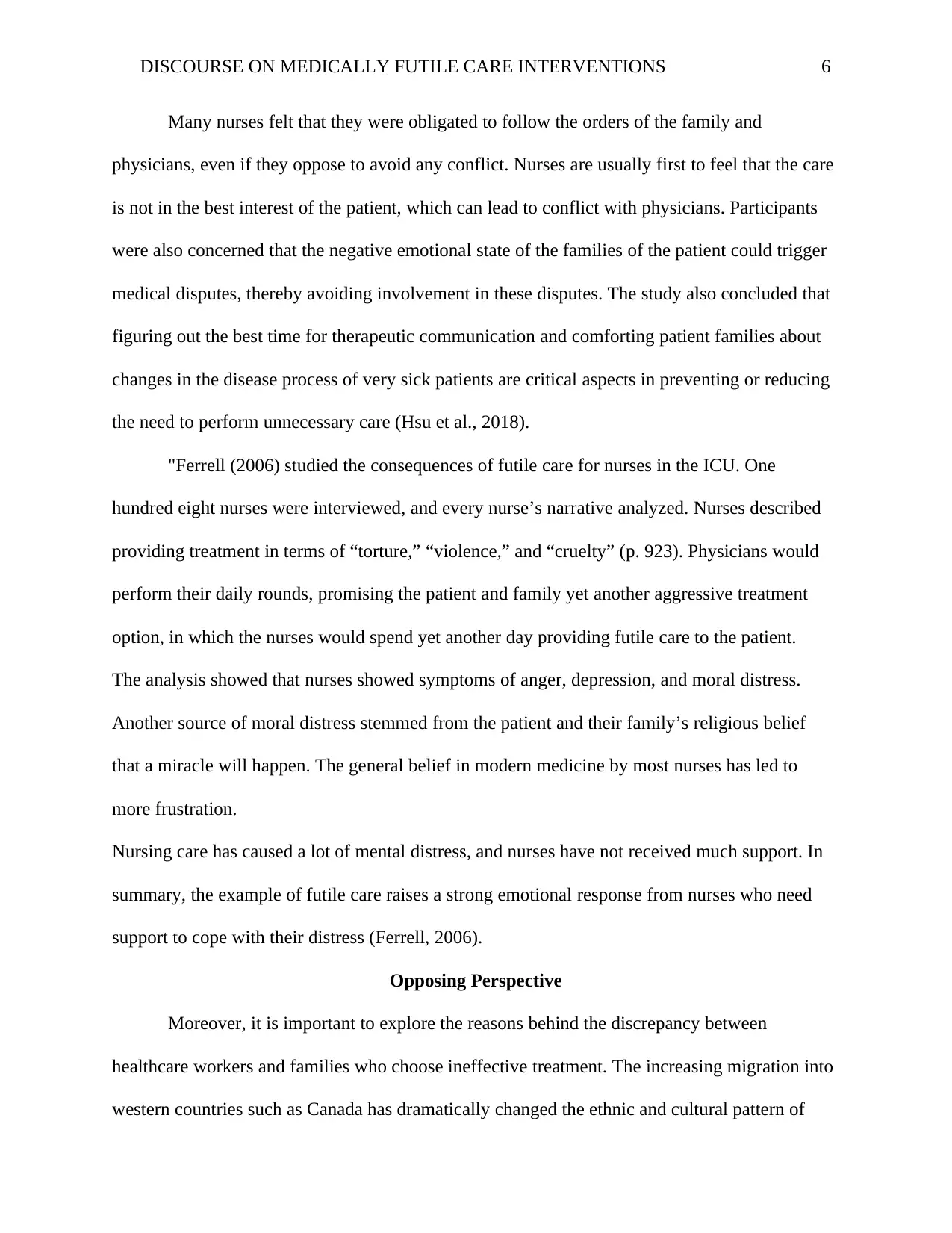
DISCOURSE ON MEDICALLY FUTILE CARE INTERVENTIONS 6
Many nurses felt that they were obligated to follow the orders of the family and
physicians, even if they oppose to avoid any conflict. Nurses are usually first to feel that the care
is not in the best interest of the patient, which can lead to conflict with physicians. Participants
were also concerned that the negative emotional state of the families of the patient could trigger
medical disputes, thereby avoiding involvement in these disputes. The study also concluded that
figuring out the best time for therapeutic communication and comforting patient families about
changes in the disease process of very sick patients are critical aspects in preventing or reducing
the need to perform unnecessary care (Hsu et al., 2018).
"Ferrell (2006) studied the consequences of futile care for nurses in the ICU. One
hundred eight nurses were interviewed, and every nurse’s narrative analyzed. Nurses described
providing treatment in terms of “torture,” “violence,” and “cruelty” (p. 923). Physicians would
perform their daily rounds, promising the patient and family yet another aggressive treatment
option, in which the nurses would spend yet another day providing futile care to the patient.
The analysis showed that nurses showed symptoms of anger, depression, and moral distress.
Another source of moral distress stemmed from the patient and their family’s religious belief
that a miracle will happen. The general belief in modern medicine by most nurses has led to
more frustration.
Nursing care has caused a lot of mental distress, and nurses have not received much support. In
summary, the example of futile care raises a strong emotional response from nurses who need
support to cope with their distress (Ferrell, 2006).
Opposing Perspective
Moreover, it is important to explore the reasons behind the discrepancy between
healthcare workers and families who choose ineffective treatment. The increasing migration into
western countries such as Canada has dramatically changed the ethnic and cultural pattern of
Many nurses felt that they were obligated to follow the orders of the family and
physicians, even if they oppose to avoid any conflict. Nurses are usually first to feel that the care
is not in the best interest of the patient, which can lead to conflict with physicians. Participants
were also concerned that the negative emotional state of the families of the patient could trigger
medical disputes, thereby avoiding involvement in these disputes. The study also concluded that
figuring out the best time for therapeutic communication and comforting patient families about
changes in the disease process of very sick patients are critical aspects in preventing or reducing
the need to perform unnecessary care (Hsu et al., 2018).
"Ferrell (2006) studied the consequences of futile care for nurses in the ICU. One
hundred eight nurses were interviewed, and every nurse’s narrative analyzed. Nurses described
providing treatment in terms of “torture,” “violence,” and “cruelty” (p. 923). Physicians would
perform their daily rounds, promising the patient and family yet another aggressive treatment
option, in which the nurses would spend yet another day providing futile care to the patient.
The analysis showed that nurses showed symptoms of anger, depression, and moral distress.
Another source of moral distress stemmed from the patient and their family’s religious belief
that a miracle will happen. The general belief in modern medicine by most nurses has led to
more frustration.
Nursing care has caused a lot of mental distress, and nurses have not received much support. In
summary, the example of futile care raises a strong emotional response from nurses who need
support to cope with their distress (Ferrell, 2006).
Opposing Perspective
Moreover, it is important to explore the reasons behind the discrepancy between
healthcare workers and families who choose ineffective treatment. The increasing migration into
western countries such as Canada has dramatically changed the ethnic and cultural pattern of
⊘ This is a preview!⊘
Do you want full access?
Subscribe today to unlock all pages.

Trusted by 1+ million students worldwide
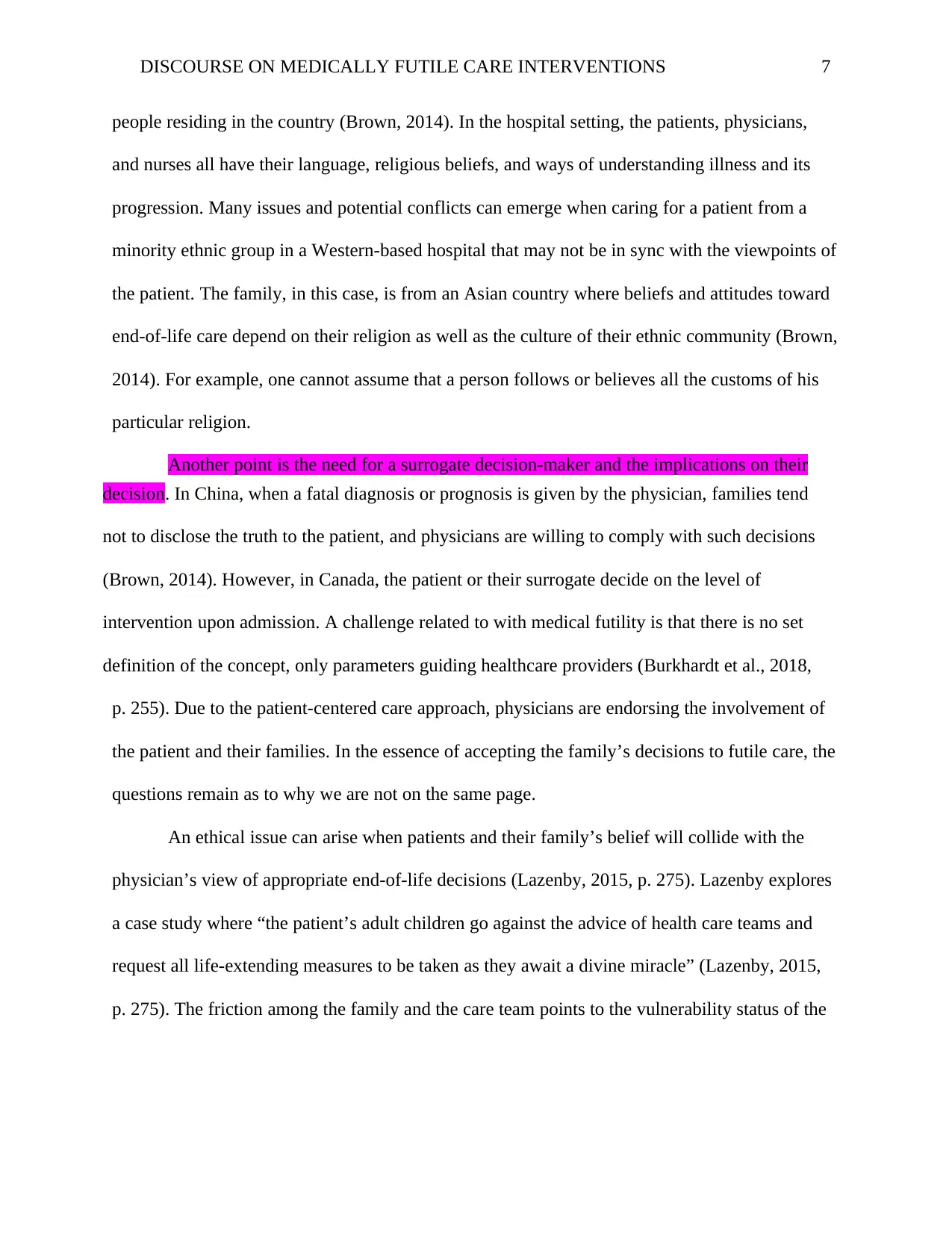
DISCOURSE ON MEDICALLY FUTILE CARE INTERVENTIONS 7
people residing in the country (Brown, 2014). In the hospital setting, the patients, physicians,
and nurses all have their language, religious beliefs, and ways of understanding illness and its
progression. Many issues and potential conflicts can emerge when caring for a patient from a
minority ethnic group in a Western-based hospital that may not be in sync with the viewpoints of
the patient. The family, in this case, is from an Asian country where beliefs and attitudes toward
end-of-life care depend on their religion as well as the culture of their ethnic community (Brown,
2014). For example, one cannot assume that a person follows or believes all the customs of his
particular religion.
Another point is the need for a surrogate decision-maker and the implications on their
decision. In China, when a fatal diagnosis or prognosis is given by the physician, families tend
not to disclose the truth to the patient, and physicians are willing to comply with such decisions
(Brown, 2014). However, in Canada, the patient or their surrogate decide on the level of
intervention upon admission. A challenge related to with medical futility is that there is no set
definition of the concept, only parameters guiding healthcare providers (Burkhardt et al., 2018,
p. 255). Due to the patient-centered care approach, physicians are endorsing the involvement of
the patient and their families. In the essence of accepting the family’s decisions to futile care, the
questions remain as to why we are not on the same page.
An ethical issue can arise when patients and their family’s belief will collide with the
physician’s view of appropriate end-of-life decisions (Lazenby, 2015, p. 275). Lazenby explores
a case study where “the patient’s adult children go against the advice of health care teams and
request all life-extending measures to be taken as they await a divine miracle” (Lazenby, 2015,
p. 275). The friction among the family and the care team points to the vulnerability status of the
people residing in the country (Brown, 2014). In the hospital setting, the patients, physicians,
and nurses all have their language, religious beliefs, and ways of understanding illness and its
progression. Many issues and potential conflicts can emerge when caring for a patient from a
minority ethnic group in a Western-based hospital that may not be in sync with the viewpoints of
the patient. The family, in this case, is from an Asian country where beliefs and attitudes toward
end-of-life care depend on their religion as well as the culture of their ethnic community (Brown,
2014). For example, one cannot assume that a person follows or believes all the customs of his
particular religion.
Another point is the need for a surrogate decision-maker and the implications on their
decision. In China, when a fatal diagnosis or prognosis is given by the physician, families tend
not to disclose the truth to the patient, and physicians are willing to comply with such decisions
(Brown, 2014). However, in Canada, the patient or their surrogate decide on the level of
intervention upon admission. A challenge related to with medical futility is that there is no set
definition of the concept, only parameters guiding healthcare providers (Burkhardt et al., 2018,
p. 255). Due to the patient-centered care approach, physicians are endorsing the involvement of
the patient and their families. In the essence of accepting the family’s decisions to futile care, the
questions remain as to why we are not on the same page.
An ethical issue can arise when patients and their family’s belief will collide with the
physician’s view of appropriate end-of-life decisions (Lazenby, 2015, p. 275). Lazenby explores
a case study where “the patient’s adult children go against the advice of health care teams and
request all life-extending measures to be taken as they await a divine miracle” (Lazenby, 2015,
p. 275). The friction among the family and the care team points to the vulnerability status of the
Paraphrase This Document
Need a fresh take? Get an instant paraphrase of this document with our AI Paraphraser
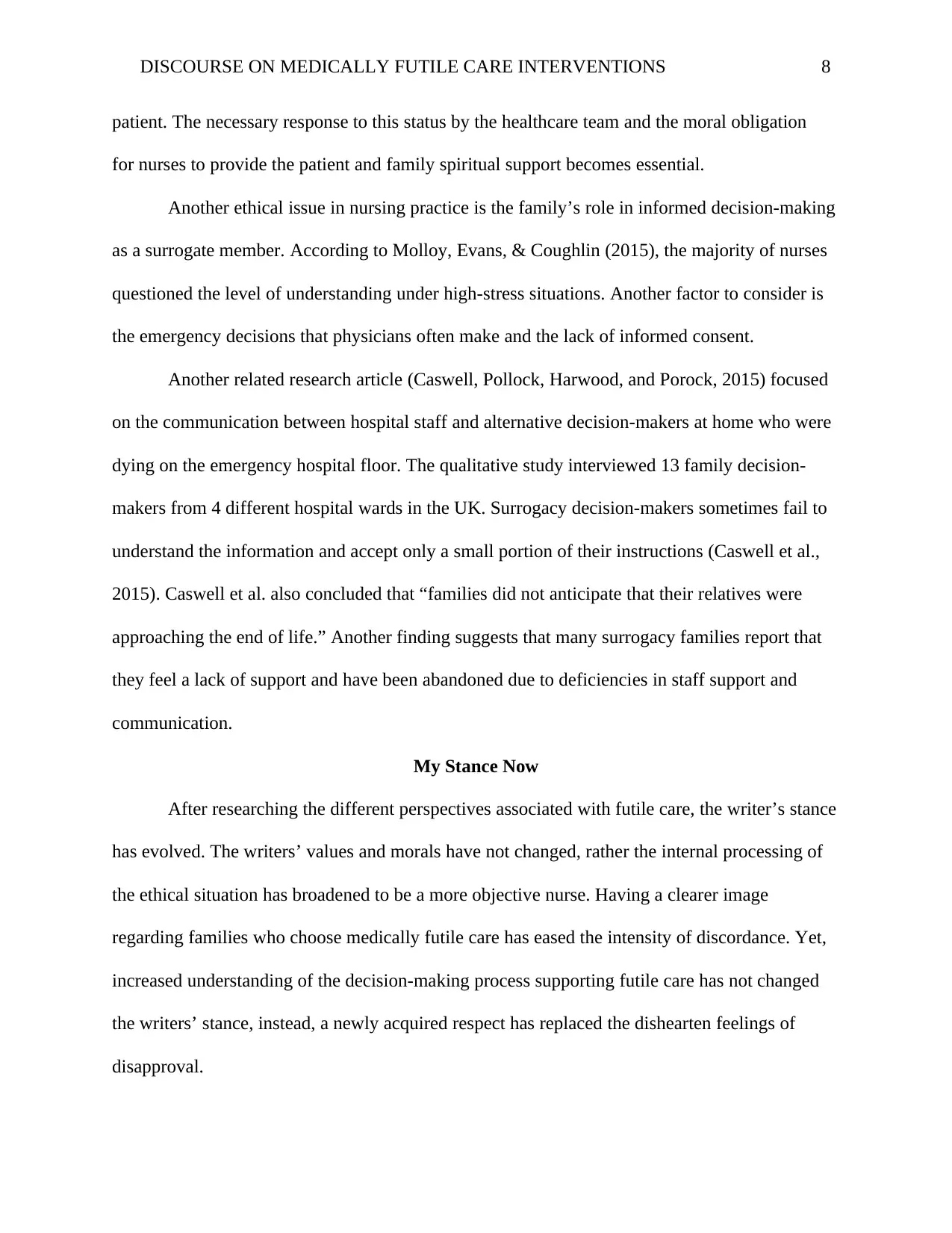
DISCOURSE ON MEDICALLY FUTILE CARE INTERVENTIONS 8
patient. The necessary response to this status by the healthcare team and the moral obligation
for nurses to provide the patient and family spiritual support becomes essential.
Another ethical issue in nursing practice is the family’s role in informed decision-making
as a surrogate member. According to Molloy, Evans, & Coughlin (2015), the majority of nurses
questioned the level of understanding under high-stress situations. Another factor to consider is
the emergency decisions that physicians often make and the lack of informed consent.
Another related research article (Caswell, Pollock, Harwood, and Porock, 2015) focused
on the communication between hospital staff and alternative decision-makers at home who were
dying on the emergency hospital floor. The qualitative study interviewed 13 family decision-
makers from 4 different hospital wards in the UK. Surrogacy decision-makers sometimes fail to
understand the information and accept only a small portion of their instructions (Caswell et al.,
2015). Caswell et al. also concluded that “families did not anticipate that their relatives were
approaching the end of life.” Another finding suggests that many surrogacy families report that
they feel a lack of support and have been abandoned due to deficiencies in staff support and
communication.
My Stance Now
After researching the different perspectives associated with futile care, the writer’s stance
has evolved. The writers’ values and morals have not changed, rather the internal processing of
the ethical situation has broadened to be a more objective nurse. Having a clearer image
regarding families who choose medically futile care has eased the intensity of discordance. Yet,
increased understanding of the decision-making process supporting futile care has not changed
the writers’ stance, instead, a newly acquired respect has replaced the dishearten feelings of
disapproval.
patient. The necessary response to this status by the healthcare team and the moral obligation
for nurses to provide the patient and family spiritual support becomes essential.
Another ethical issue in nursing practice is the family’s role in informed decision-making
as a surrogate member. According to Molloy, Evans, & Coughlin (2015), the majority of nurses
questioned the level of understanding under high-stress situations. Another factor to consider is
the emergency decisions that physicians often make and the lack of informed consent.
Another related research article (Caswell, Pollock, Harwood, and Porock, 2015) focused
on the communication between hospital staff and alternative decision-makers at home who were
dying on the emergency hospital floor. The qualitative study interviewed 13 family decision-
makers from 4 different hospital wards in the UK. Surrogacy decision-makers sometimes fail to
understand the information and accept only a small portion of their instructions (Caswell et al.,
2015). Caswell et al. also concluded that “families did not anticipate that their relatives were
approaching the end of life.” Another finding suggests that many surrogacy families report that
they feel a lack of support and have been abandoned due to deficiencies in staff support and
communication.
My Stance Now
After researching the different perspectives associated with futile care, the writer’s stance
has evolved. The writers’ values and morals have not changed, rather the internal processing of
the ethical situation has broadened to be a more objective nurse. Having a clearer image
regarding families who choose medically futile care has eased the intensity of discordance. Yet,
increased understanding of the decision-making process supporting futile care has not changed
the writers’ stance, instead, a newly acquired respect has replaced the dishearten feelings of
disapproval.
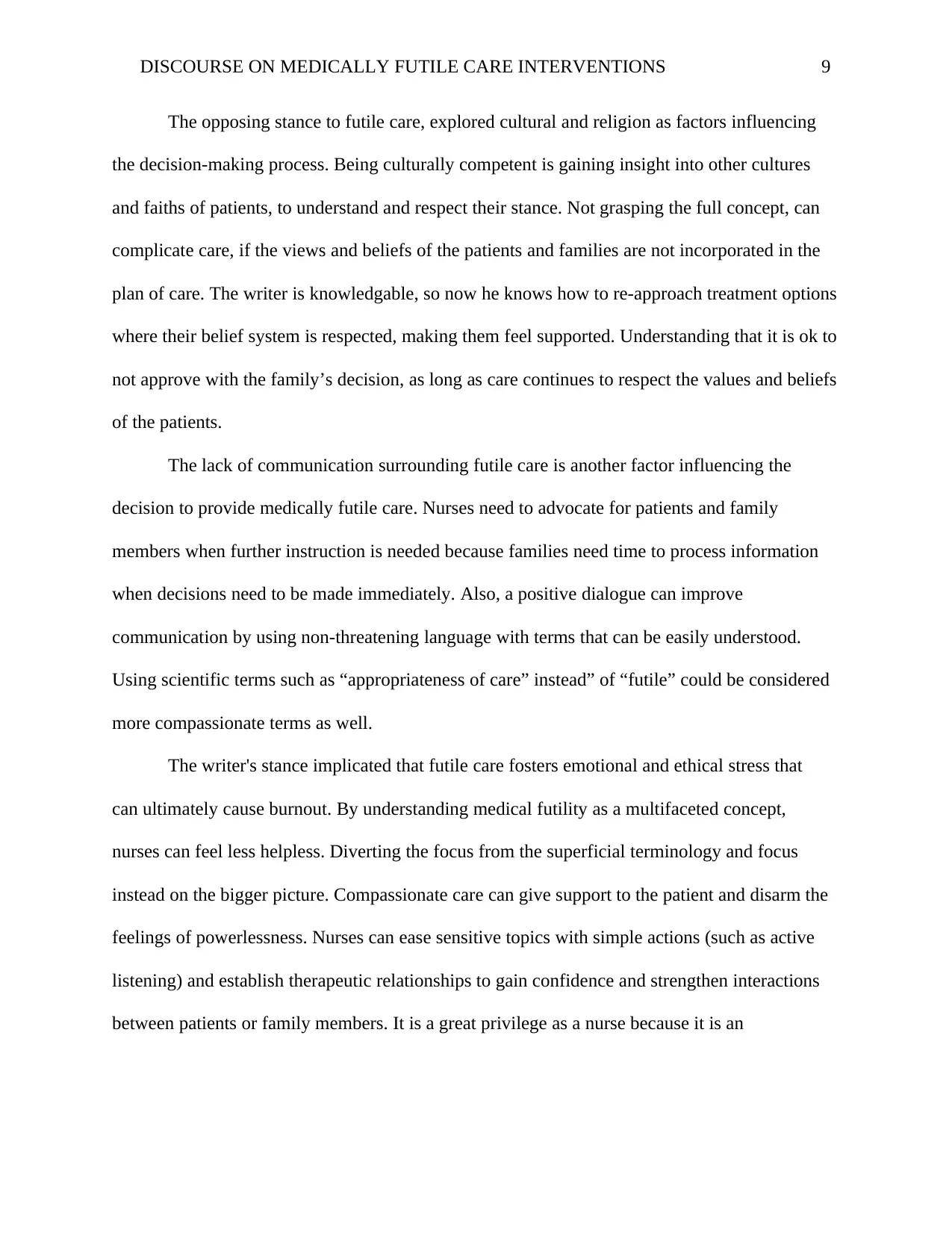
DISCOURSE ON MEDICALLY FUTILE CARE INTERVENTIONS 9
The opposing stance to futile care, explored cultural and religion as factors influencing
the decision-making process. Being culturally competent is gaining insight into other cultures
and faiths of patients, to understand and respect their stance. Not grasping the full concept, can
complicate care, if the views and beliefs of the patients and families are not incorporated in the
plan of care. The writer is knowledgable, so now he knows how to re-approach treatment options
where their belief system is respected, making them feel supported. Understanding that it is ok to
not approve with the family’s decision, as long as care continues to respect the values and beliefs
of the patients.
The lack of communication surrounding futile care is another factor influencing the
decision to provide medically futile care. Nurses need to advocate for patients and family
members when further instruction is needed because families need time to process information
when decisions need to be made immediately. Also, a positive dialogue can improve
communication by using non-threatening language with terms that can be easily understood.
Using scientific terms such as “appropriateness of care” instead” of “futile” could be considered
more compassionate terms as well.
The writer's stance implicated that futile care fosters emotional and ethical stress that
can ultimately cause burnout. By understanding medical futility as a multifaceted concept,
nurses can feel less helpless. Diverting the focus from the superficial terminology and focus
instead on the bigger picture. Compassionate care can give support to the patient and disarm the
feelings of powerlessness. Nurses can ease sensitive topics with simple actions (such as active
listening) and establish therapeutic relationships to gain confidence and strengthen interactions
between patients or family members. It is a great privilege as a nurse because it is an
The opposing stance to futile care, explored cultural and religion as factors influencing
the decision-making process. Being culturally competent is gaining insight into other cultures
and faiths of patients, to understand and respect their stance. Not grasping the full concept, can
complicate care, if the views and beliefs of the patients and families are not incorporated in the
plan of care. The writer is knowledgable, so now he knows how to re-approach treatment options
where their belief system is respected, making them feel supported. Understanding that it is ok to
not approve with the family’s decision, as long as care continues to respect the values and beliefs
of the patients.
The lack of communication surrounding futile care is another factor influencing the
decision to provide medically futile care. Nurses need to advocate for patients and family
members when further instruction is needed because families need time to process information
when decisions need to be made immediately. Also, a positive dialogue can improve
communication by using non-threatening language with terms that can be easily understood.
Using scientific terms such as “appropriateness of care” instead” of “futile” could be considered
more compassionate terms as well.
The writer's stance implicated that futile care fosters emotional and ethical stress that
can ultimately cause burnout. By understanding medical futility as a multifaceted concept,
nurses can feel less helpless. Diverting the focus from the superficial terminology and focus
instead on the bigger picture. Compassionate care can give support to the patient and disarm the
feelings of powerlessness. Nurses can ease sensitive topics with simple actions (such as active
listening) and establish therapeutic relationships to gain confidence and strengthen interactions
between patients or family members. It is a great privilege as a nurse because it is an
⊘ This is a preview!⊘
Do you want full access?
Subscribe today to unlock all pages.

Trusted by 1+ million students worldwide
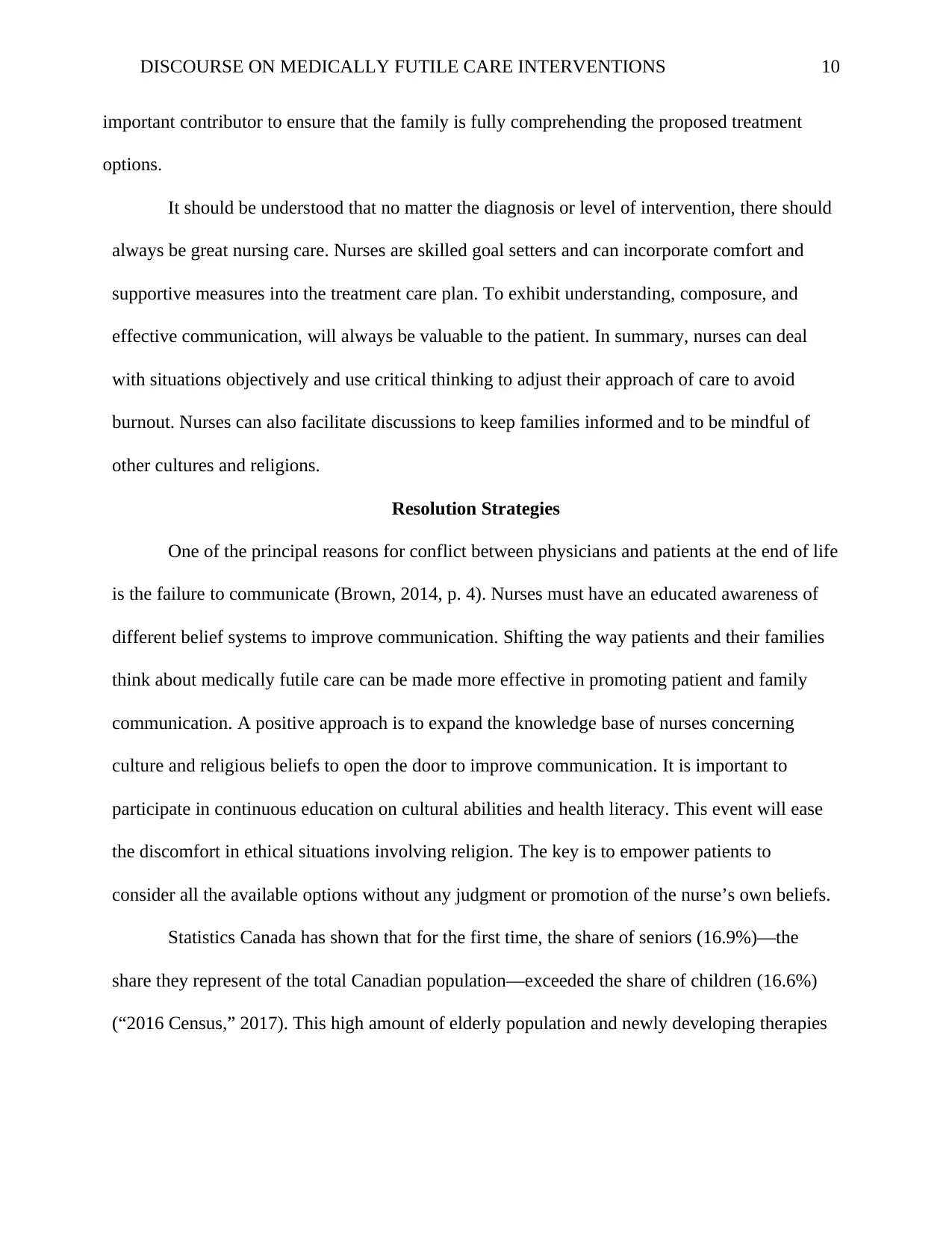
DISCOURSE ON MEDICALLY FUTILE CARE INTERVENTIONS 10
important contributor to ensure that the family is fully comprehending the proposed treatment
options.
It should be understood that no matter the diagnosis or level of intervention, there should
always be great nursing care. Nurses are skilled goal setters and can incorporate comfort and
supportive measures into the treatment care plan. To exhibit understanding, composure, and
effective communication, will always be valuable to the patient. In summary, nurses can deal
with situations objectively and use critical thinking to adjust their approach of care to avoid
burnout. Nurses can also facilitate discussions to keep families informed and to be mindful of
other cultures and religions.
Resolution Strategies
One of the principal reasons for conflict between physicians and patients at the end of life
is the failure to communicate (Brown, 2014, p. 4). Nurses must have an educated awareness of
different belief systems to improve communication. Shifting the way patients and their families
think about medically futile care can be made more effective in promoting patient and family
communication. A positive approach is to expand the knowledge base of nurses concerning
culture and religious beliefs to open the door to improve communication. It is important to
participate in continuous education on cultural abilities and health literacy. This event will ease
the discomfort in ethical situations involving religion. The key is to empower patients to
consider all the available options without any judgment or promotion of the nurse’s own beliefs.
Statistics Canada has shown that for the first time, the share of seniors (16.9%)—the
share they represent of the total Canadian population—exceeded the share of children (16.6%)
(“2016 Census,” 2017). This high amount of elderly population and newly developing therapies
important contributor to ensure that the family is fully comprehending the proposed treatment
options.
It should be understood that no matter the diagnosis or level of intervention, there should
always be great nursing care. Nurses are skilled goal setters and can incorporate comfort and
supportive measures into the treatment care plan. To exhibit understanding, composure, and
effective communication, will always be valuable to the patient. In summary, nurses can deal
with situations objectively and use critical thinking to adjust their approach of care to avoid
burnout. Nurses can also facilitate discussions to keep families informed and to be mindful of
other cultures and religions.
Resolution Strategies
One of the principal reasons for conflict between physicians and patients at the end of life
is the failure to communicate (Brown, 2014, p. 4). Nurses must have an educated awareness of
different belief systems to improve communication. Shifting the way patients and their families
think about medically futile care can be made more effective in promoting patient and family
communication. A positive approach is to expand the knowledge base of nurses concerning
culture and religious beliefs to open the door to improve communication. It is important to
participate in continuous education on cultural abilities and health literacy. This event will ease
the discomfort in ethical situations involving religion. The key is to empower patients to
consider all the available options without any judgment or promotion of the nurse’s own beliefs.
Statistics Canada has shown that for the first time, the share of seniors (16.9%)—the
share they represent of the total Canadian population—exceeded the share of children (16.6%)
(“2016 Census,” 2017). This high amount of elderly population and newly developing therapies
Paraphrase This Document
Need a fresh take? Get an instant paraphrase of this document with our AI Paraphraser
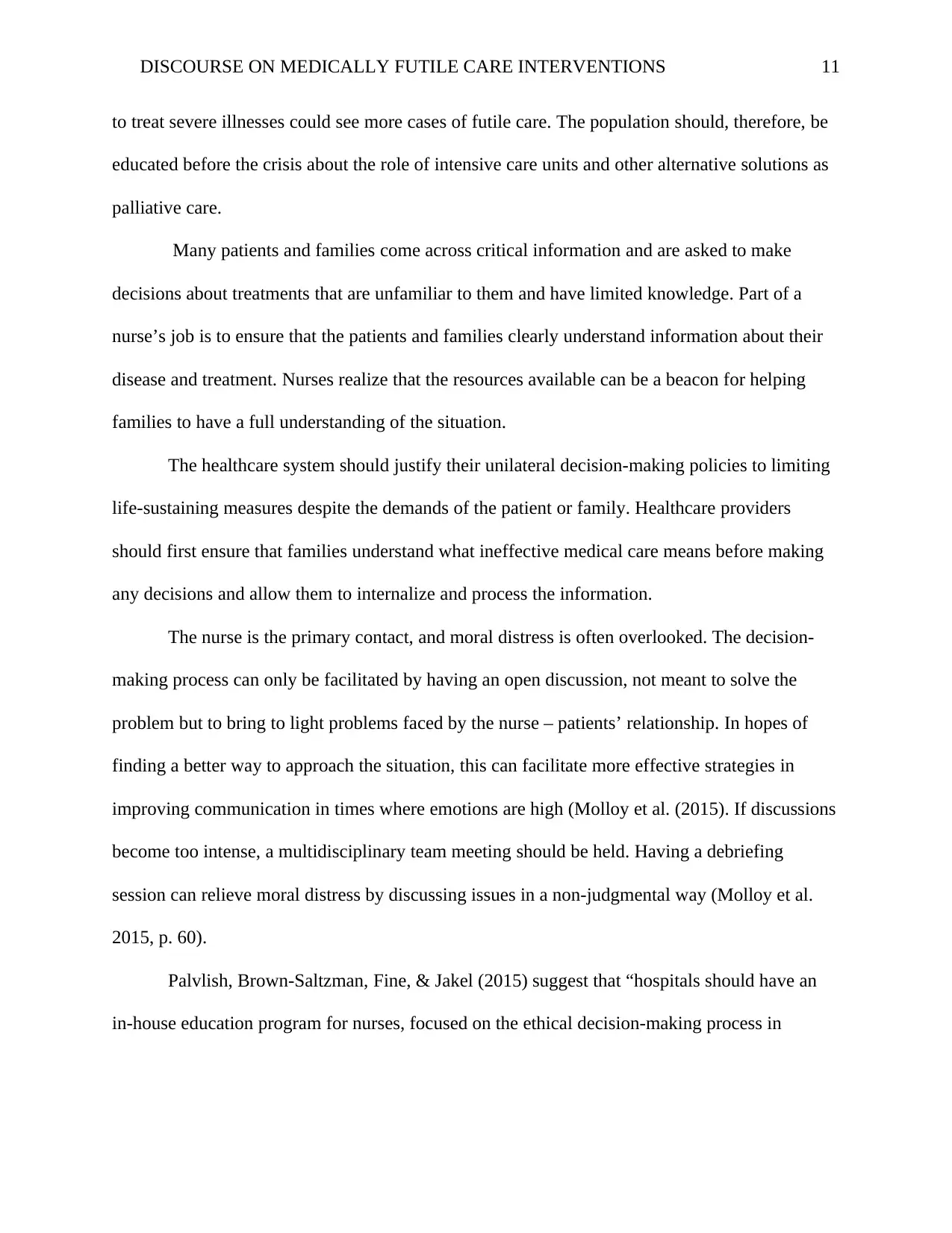
DISCOURSE ON MEDICALLY FUTILE CARE INTERVENTIONS 11
to treat severe illnesses could see more cases of futile care. The population should, therefore, be
educated before the crisis about the role of intensive care units and other alternative solutions as
palliative care.
Many patients and families come across critical information and are asked to make
decisions about treatments that are unfamiliar to them and have limited knowledge. Part of a
nurse’s job is to ensure that the patients and families clearly understand information about their
disease and treatment. Nurses realize that the resources available can be a beacon for helping
families to have a full understanding of the situation.
The healthcare system should justify their unilateral decision-making policies to limiting
life-sustaining measures despite the demands of the patient or family. Healthcare providers
should first ensure that families understand what ineffective medical care means before making
any decisions and allow them to internalize and process the information.
The nurse is the primary contact, and moral distress is often overlooked. The decision-
making process can only be facilitated by having an open discussion, not meant to solve the
problem but to bring to light problems faced by the nurse – patients’ relationship. In hopes of
finding a better way to approach the situation, this can facilitate more effective strategies in
improving communication in times where emotions are high (Molloy et al. (2015). If discussions
become too intense, a multidisciplinary team meeting should be held. Having a debriefing
session can relieve moral distress by discussing issues in a non-judgmental way (Molloy et al.
2015, p. 60).
Palvlish, Brown-Saltzman, Fine, & Jakel (2015) suggest that “hospitals should have an
in-house education program for nurses, focused on the ethical decision-making process in
to treat severe illnesses could see more cases of futile care. The population should, therefore, be
educated before the crisis about the role of intensive care units and other alternative solutions as
palliative care.
Many patients and families come across critical information and are asked to make
decisions about treatments that are unfamiliar to them and have limited knowledge. Part of a
nurse’s job is to ensure that the patients and families clearly understand information about their
disease and treatment. Nurses realize that the resources available can be a beacon for helping
families to have a full understanding of the situation.
The healthcare system should justify their unilateral decision-making policies to limiting
life-sustaining measures despite the demands of the patient or family. Healthcare providers
should first ensure that families understand what ineffective medical care means before making
any decisions and allow them to internalize and process the information.
The nurse is the primary contact, and moral distress is often overlooked. The decision-
making process can only be facilitated by having an open discussion, not meant to solve the
problem but to bring to light problems faced by the nurse – patients’ relationship. In hopes of
finding a better way to approach the situation, this can facilitate more effective strategies in
improving communication in times where emotions are high (Molloy et al. (2015). If discussions
become too intense, a multidisciplinary team meeting should be held. Having a debriefing
session can relieve moral distress by discussing issues in a non-judgmental way (Molloy et al.
2015, p. 60).
Palvlish, Brown-Saltzman, Fine, & Jakel (2015) suggest that “hospitals should have an
in-house education program for nurses, focused on the ethical decision-making process in
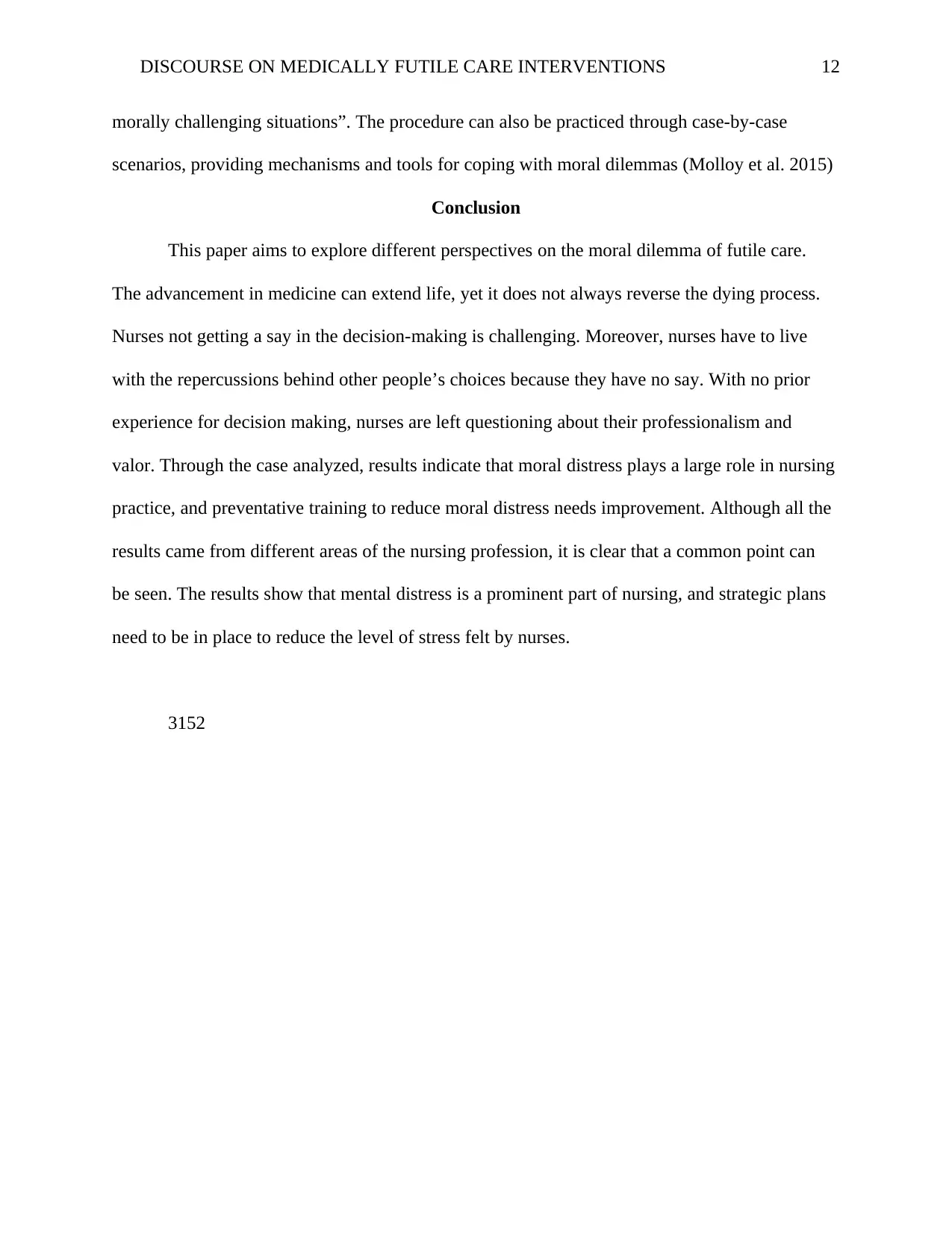
DISCOURSE ON MEDICALLY FUTILE CARE INTERVENTIONS 12
morally challenging situations”. The procedure can also be practiced through case-by-case
scenarios, providing mechanisms and tools for coping with moral dilemmas (Molloy et al. 2015)
Conclusion
This paper aims to explore different perspectives on the moral dilemma of futile care.
The advancement in medicine can extend life, yet it does not always reverse the dying process.
Nurses not getting a say in the decision-making is challenging. Moreover, nurses have to live
with the repercussions behind other people’s choices because they have no say. With no prior
experience for decision making, nurses are left questioning about their professionalism and
valor. Through the case analyzed, results indicate that moral distress plays a large role in nursing
practice, and preventative training to reduce moral distress needs improvement. Although all the
results came from different areas of the nursing profession, it is clear that a common point can
be seen. The results show that mental distress is a prominent part of nursing, and strategic plans
need to be in place to reduce the level of stress felt by nurses.
3152
morally challenging situations”. The procedure can also be practiced through case-by-case
scenarios, providing mechanisms and tools for coping with moral dilemmas (Molloy et al. 2015)
Conclusion
This paper aims to explore different perspectives on the moral dilemma of futile care.
The advancement in medicine can extend life, yet it does not always reverse the dying process.
Nurses not getting a say in the decision-making is challenging. Moreover, nurses have to live
with the repercussions behind other people’s choices because they have no say. With no prior
experience for decision making, nurses are left questioning about their professionalism and
valor. Through the case analyzed, results indicate that moral distress plays a large role in nursing
practice, and preventative training to reduce moral distress needs improvement. Although all the
results came from different areas of the nursing profession, it is clear that a common point can
be seen. The results show that mental distress is a prominent part of nursing, and strategic plans
need to be in place to reduce the level of stress felt by nurses.
3152
⊘ This is a preview!⊘
Do you want full access?
Subscribe today to unlock all pages.

Trusted by 1+ million students worldwide
1 out of 14
Related Documents
Your All-in-One AI-Powered Toolkit for Academic Success.
+13062052269
info@desklib.com
Available 24*7 on WhatsApp / Email
![[object Object]](/_next/static/media/star-bottom.7253800d.svg)
Unlock your academic potential
Copyright © 2020–2026 A2Z Services. All Rights Reserved. Developed and managed by ZUCOL.





